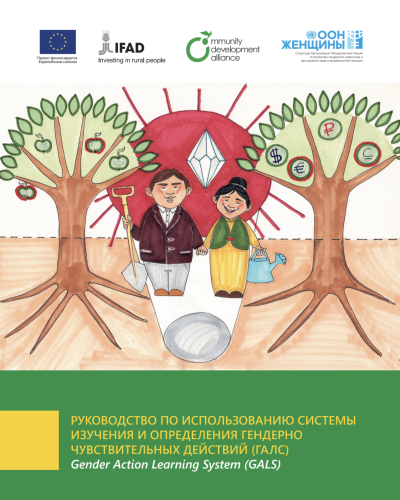GALS – community-led empowerment methodology to promote more harmonious and violence-free relationships in families and communities

The GALS manual is an outcome of multi-year efforts to pilot and adapt the Gender Action Learning System methodology to the local context. GALS is a community-led empowerment methodology to promote more harmonious and violence-free relationships in families and communities. It is aimed to connect and build synergies between various groups of people in a pursuit of the common vision of promoting a harmonious and life free of gender-based violence for women and girls within their families and the wider communities.
The manual was developed within the framework of the EU-funded project “Across Generations and Gender Borders – Communities Combatting Gender-Based Violence in Kyrgyzstan”. It specifically focuses on non-consensual marriage practices by tackling the root causes of violence against women and girls. Such root causes include deeply rooted patriarchal attitudes, pervasive gender stereotypes and harmful social norms. The project was funded by the European Union and was implemented by UN Women in Kyrgyzstan in partnership with HelpAge International and Agents of Change.
Authors: Gulmira Rasulova, Kyial Tilebaldieva, Nurai Mamytova
Peer review working group: Ms. Baken Dosalieva (NGO “Women’s Support Center”), Ms. Nargiza Eshtaeva (NGO “Ayalzat”), Mr. Nurdin Duishenbekov (NGO “Social Programme Foundation”), Ms. Myrzash Shabdanbekova (NGO “Lady Shirin”), Ms. Saliya Akulova (NGO “Agents of Changes”).
Illustrator: Cholpon Alamanova
Editor: Ainuru Bulekbaeva
Translator: Ulyana Ivchenko
GALS is based on the principles of good practice in the field of adult education and participatory methodologies. Its goal is to help participants develop strong visions for change and concrete strategies and plans to change their lives for the better and, through personal experiences, broaden the minds of their family members, colleagues and communities in order to increase their opportunities to improve the quality of their lives. As the basis for advocacy for change at the macro-level.
In total 1,000 copies were published and distributed among partners from the Ministry of Labor and Social Development, international development organizations, representatives of local self-government and civil society.






